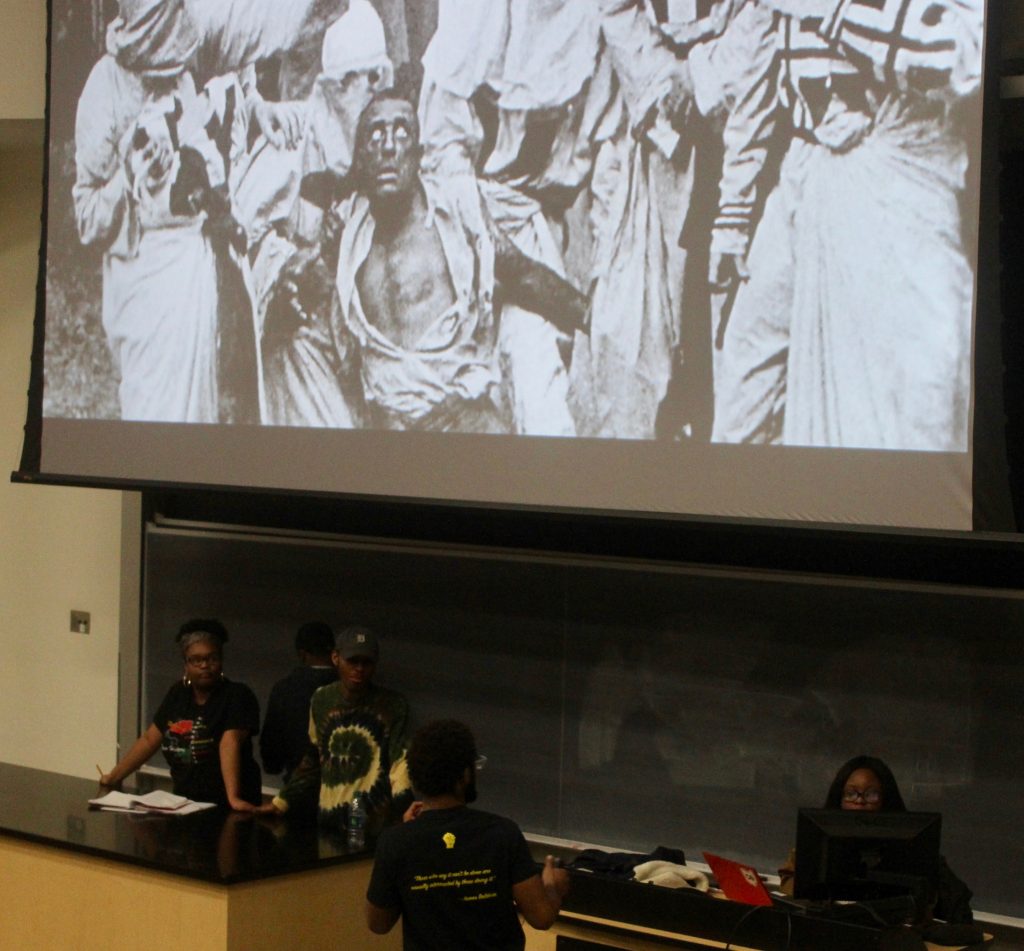By DAVID DUPONT
BG Independent News
The Dorothy and Lillian Gish Film Theater at Bowling Green State University should be renamed, a task force has recommended.
The 1915 movie had a role in reviving the Ku Klux Klan in the early 20th century, and helping spread it from the South to other areas of the country, including Wood County.
The task force was set up after members the Black Student Union questioned naming the theater after Lillian Gish, who had a starring role in “The Birth of a Nation” by D.W. Griffith. According to the report: “‘The Birth of a Nation’ is widely recognized as the most offensively racist American film for its depictions of African Americans in the Civil War and Reconstruction. Director, producer, and script co-writer D.W. Griffith maintained in interviews and comments throughout his career a commitment to the film and defended it as a truthful representation of history.”
“To disregard the power of the Gish name and image and its undeniable, strong association with ‘The Birth of a Nation’ would be to ignore the impact of the film and how it has advanced racist and exclusionary practices,” the report concluded.
President Rodney Rogers will now review the report and give his recommendation to the university’s board of trustees when they meet in May.
“I am reviewing the report and considering its recommendations while also discussing and sharing the task force’s work with our various constituencies. Following those conversations, I will share my recommendations with our broader University community,” Rogers wrote in a letter acknowledging receipt of the report.

The Gish Theater was located in Hanna Hall since 1976 where it was created through the efforts of English Professor Ralph Wolfe as a home for the university growing film studies program.
Wolfe continued as curator of the theater until the year before it moved. He opposed both the move, and the call to change the name. In comments after the most recent town hall, he minimized Gish’s role in “Birth of a Nation” and its significance in her long career, which included 108 movies as well as stage and television credits.
That theater was torn down as part of the renovation of Hanna Hall into the Maurer Center, the new home of the College of Business.
The existing theater in the Bowen-Thompson Student Union was renamed for the Gishes.
The report states, that the name became a salient issue after the Black Student Union hosted a screening of the film “13th.” That documentary film explores “the relationship between slavery, Jim Crow, racism, and the prison-industrial complex.”
The film includes clips from “The Birth of a Nation” that “show the lasting impact of the stereotypes of black men in America.”
Students noted the irony of exhibiting the film in a theater named for a star of “Birth of a Nation,” and launched a drive in March to have it changed. The BSU hosted two town hall meetings to discuss the issue, and President Rodney Rogers formed the task force to study the issue.
That is just one of several recent films including the upcoming PBS series “Reconstruction” that use the film to illustrate racist attitudes. Many of those clips feature Gish’s image, the task force noted.
In its deliberations, the 12-member task force, made up of BGSU students, faculty, and staff, and chaired by Raymond Craig Dean of the College of Arts and Sciences, considered both the university’s policy for naming buildings and its policy related to racial and ethnic harassment.

It found: “The reference to ‘The Birth of a Nation’ and the images of Lillian Gish in the display area outside the theater contribute to an intimidating, even hostile, educational environment. The display, with its oversize images and text, are prominent in a well-used space and evoke the film and its racist legacy.”
Other findings were:
° “The stereotypes of African Americans in ‘The Birth of a Nation’ are offensive, and the film presents a white supremacist vision.”
° “Lillian Gish’s role in the film is central, and thus her image evokes and embodies the racism explicit in ‘The Birth of a Nation.’”
° In addition to the racist characterizations of African Americans, Griffith also presents Gish’s Elsie as the ideal white Aryan woman, anticipating the white supremacists’ “14 Words”: “Because the beauty of the White Aryan woman must not perish from the earth.”
° Lillian Gish and Dorothy Gish do not appear to have been advocates for racist or exclusionary practices or perspectives.
° Lillian Gish spoke in interviews about actors being accountable for the roles they choose. This may speak to her recognition of the social impact of this film and her role in it. In a 1983 interview with a BGSU publication, Lillian Gish talked about actors being accountable for the roles they choose: “I feel strongly that actors and actresses today need to take responsibility for what they say and do in film, even if they are only acting.”
° “Changing the name of the theater at BGSU will not erase film history, US cultural history, ‘Hollywood history,’ or the legacy of the Gish sisters.”
The Gish name will not be erased at BGSU. A scholarship given in her name, the honorary degree bestowed on her in 1976, and the archives of Gish material will remain.
Also, the task force calls for a display in the lobby of the theater or inside the venue that addresses the legacy of the Gish sisters as well as the history of theater, including why it was renamed, and a discussion of the place “The Birth of Nation” holds in developing American attitudes toward race.
The task force said in particular it did not want to diminish Lillian Gish’s career.
“Her work is expansive and her technical achievement great; in no way is our intent to minimize her accomplishments or contributions to film culture and history. However, as an educational institution, BGSU has a primary responsibility to its students and an overriding obligation to create an inclusive learning environment.”




